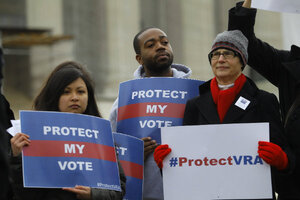After Supreme Court, Congress must move on Voting Rights Act
The Voting Rights Act has been America’s most effective tool to eradicate racial discrimination in voting. Today, a sharply divided Supreme Court has thrown the future of this critical tool in limbo by striking down a key provision. It’s now up to Congress to revive the act.

Voting rights activists gather in front of the Supreme Court this February as the court heard arguments in the Shelby County v. Holder case on the Voting Rights Act. Op-ed contributor Myrna Pérez writes: 'It is fair to question whether congressional dysfunction will stall a legislative response to today’s ruling. But on an issue as important as the fundamental right to vote, advocates remain confident America’s leaders can come together in a bipartisan way.'
Gary Cameron/Reuters/File
New York
For nearly five decades, the Voting Rights Act has been America’s most effective tool to eradicate racial discrimination in voting. Today, a sharply divided Supreme Court has thrown the future of this critical tool in limbo by striking down a key provision of the act. It’s now up to Congress to revive the act.
The court upheld the act’s core – known as Section 5 – that requires jurisdictions with a history of racial discrimination in voting to gain federal approval before changing their voting laws. But it struck down the formula that determines which jurisdictions are covered by Section 5, which as a practical matter means they do not require pre-approval at this time.
The majority held that the formula was based on old data, but it dismissed in essentially one paragraph the vast record Congress considered – about 15,000 pages – which supported its conclusion that certain jurisdictions needed to be targeted
In light of the Supreme Court’s second-guessing of Congress, lawmakers must act in a decisive and bipartisan way – as they did when reauthorizing the law in 2006 – to protect voting rights of countless Americans and ensure that elections remain free, fair, and accessible.
In effect, Section 5 of the Voting Rights Act blocks discrimination before it occurs. This landmark law was passed in 1965, but there is ample proof it is still critically important today. States across the country introduced a wave of voting restrictions since the beginning of 2011. With the help of Section 5, citizens, courts, and the Department of Justice were able to stop changes in voting laws that were discriminatory. For example, Section 5 blocked Texas’s strict voter ID law and its redistricting plans. It also helped drastically improve South Carolina’s voter ID law by expanding the “reasonable impediment” exception to allow citizens without an ID to vote.
Without a robust mechanism like Section 5 to block and deter discriminatory voting changes, voting rights advocates will need to be even more vigilant. After this decision, states and localities may attempt to revive blocked laws or implement changes that have been passed but not yet submitted for federal approval. For example, Texas’s attorney general said today his state’s strict voter ID law, which was blocked by a court because of the discriminatory effect it will have on minority voters, can now go into effect.
Further, some jurisdictions may seek to enact new restrictive laws or try to put in place blocked changes that, despite not being in effect, technically remain on the books. For instance, a 2007 Texas provision, which limits eligibility for a position of supervisor of a water district to landowners that are registered to vote, is still on the books.
The court’s decision does not mean states or other jurisdictions are free to enact racially discriminatory measures, and voting rights advocates will work tirelessly to push back against laws that are discriminatory. But, we have lost an important and effective tool. Congress must act swiftly to put a new coverage formula in place to avoid the fallout that may result from today’s decision.
In 2006, Congress voted nearly unanimously to reauthorize the Voting Rights Act for another 25 years. The vote – 98-0 in the Senate and 390-33 in the House – came after more than 20 hearings and thousands of pages of evidence showing the continued need for the critical provision of federal approval. Since then, the Justice Department has formally blocked 31 voting changes and Section 5 has deterred countless more.
It is fair to question whether congressional dysfunction will stall a legislative response to today’s ruling. But on an issue as important as the fundamental right to vote, advocates remain confident America’s leaders can come together in a bipartisan way. They must.
Myrna Pérez is deputy director of the Democracy Program at the Brennan Center for Justice at New York University School of Law.

